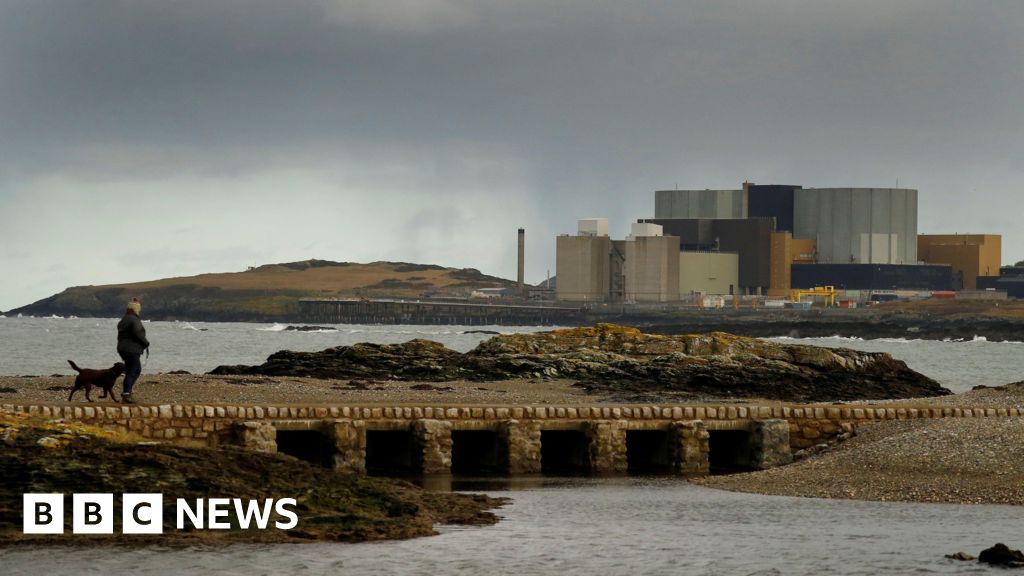- author, hugh thomas
- role, BBC Wales Business Correspondent
-
The UK government has announced that Wylfa on the island of Anglesey has been selected as the site for a large-scale nuclear power station.
The international energy company has begun talks with the UK government to begin construction of the new Wylfa power station.
UK government Energy Secretary Clare Coutinho said the site would provide “thousands of well-paid jobs”.
Welsh Minister David TC Davies said there was “no set date” for when the nuclear power station would be built and operational, but added: “Wylfa is destined to have a nuclear power station.” said.
Asked whether the new plants would be ready by 2040, he said: “Traditionally that takes a much longer time.”
Davis said several international energy companies are interested in investing in the land.
He told Radio Wales Breakfast that he had “informally met” with representatives of South Korean energy company Kepco at a dinner.
He said they were “very interested” but “there are appropriate routes.”
The new power station at Wylfa will be similar in size to a new power station at Hinkley, Somerset, and a development planned at Sizewell, Suffolk.
This site is located on the north coast of Anglesey and was the site of the first nuclear power station in the early 1970s.
The UK government wants to quadruple its nuclear power capacity to up to 25 gigawatts by 2050 by introducing new power plants as older power plants reach the end of operation.
“Anglesey has a proud nuclear history and is right to once again play a central role in strengthening the UK's energy security,” Mr Coutinho said.
He added that Wylfa would bring “clean, reliable electricity” to millions of homes and create “thousands of good-paying jobs” and investment in North Wales.
Wylfa's previous power plant stopped generating electricity at the end of 2015.
Japanese operator Hitachi canceled plans for a new reactor in 2020 and mothballed the site.
During the spring budget, Prime Minister Jeremy Hunt announced that the operator had sold the site to the UK government.
Ministers also purchased another premises owned by Hitchai in Oldbury, Gloucestershire.
Great British Nuclear, the government agency tasked with delivering more nuclear power, is overseeing the purchase of both sites, and is looking to build small modular reactors and large power plants as part of the UK's nuclear energy supply. We are considering using .
Greater British Nuclear chief executive Gwen Parry-Jones said she was looking forward to a “market engagement programme” for large gigawatt electricity suppliers.
Jo Stevens, Labour's shadow secretary for Wales, said she would “welcome any progress” but said people on Anglesey would “believe it when they see it”.
“It has been five years since ministers sat by and watched as previous plans for Wylfa failed,” she said.
“That project is already 50 per cent complete by now and will see the benefit of thousands of construction jobs and around 1,000 more permanent jobs.”
Analysis by BBC Political Editor Gareth Lewis
This seems like a good idea in an election year. The constituency will be contested by the Conservatives, Labor and Plaid Cymru.
Nuclear projects bring prestige and the promise of thousands of jobs, help meet environmental goals, and appear to shine big, at least in the artist's impression.
Wilfa has been here before. For every brave new nuclear dawn on Anglesey, there are always dark clouds of past experience looming on the horizon.
Today is a step, and much more must be done over the decades, especially on cost…long after the 2024 general election is ancient history.
“Dinosaurs that must not be brought back to life”
People Against Wylfa B, a campaign group opposed to the Anglesey nuclear power plant, called it a “dinosaur” that “should never be brought back”.
The group instead called for greater investment in renewable energy schemes that use wind, solar and hydropower.
Pauv member Linda Rogers said the site was not built in time to help with the climate crisis.
“We need to invest in the kinds of jobs and energy supplies that are sustainable and can be built quickly,” she says.
The Bechtel-Westinghouse partnership has also expressed interest in building a new Wilfa plant.
Prospect, one of the trade unions representing workers in the nuclear industry, said Wylfa was “the best location in Europe” for a large-scale nuclear power plant.
Sue Ferns, the union's deputy general secretary, said: “New gigawatt nuclear power plants are critical to achieving net zero and energy security.”
“But they also retain well-paid, highly skilled jobs, meaning this project will be a huge boost to the Welsh economy.
“Now we need to be laser-focused on new nuclear deliveries to ensure skills and experience are not lost, and to reduce costs as we make progress.”


